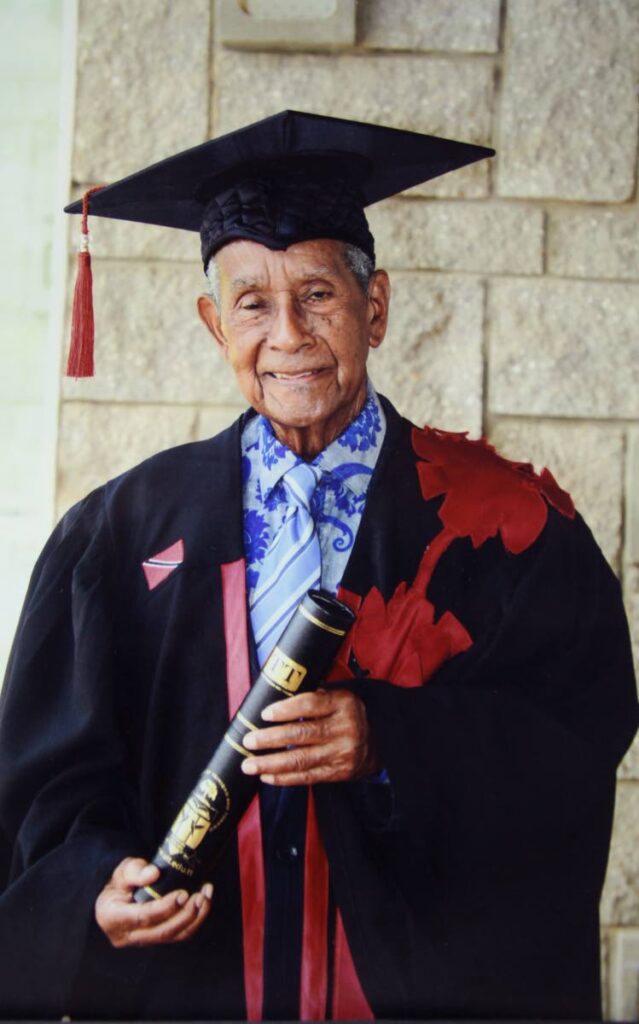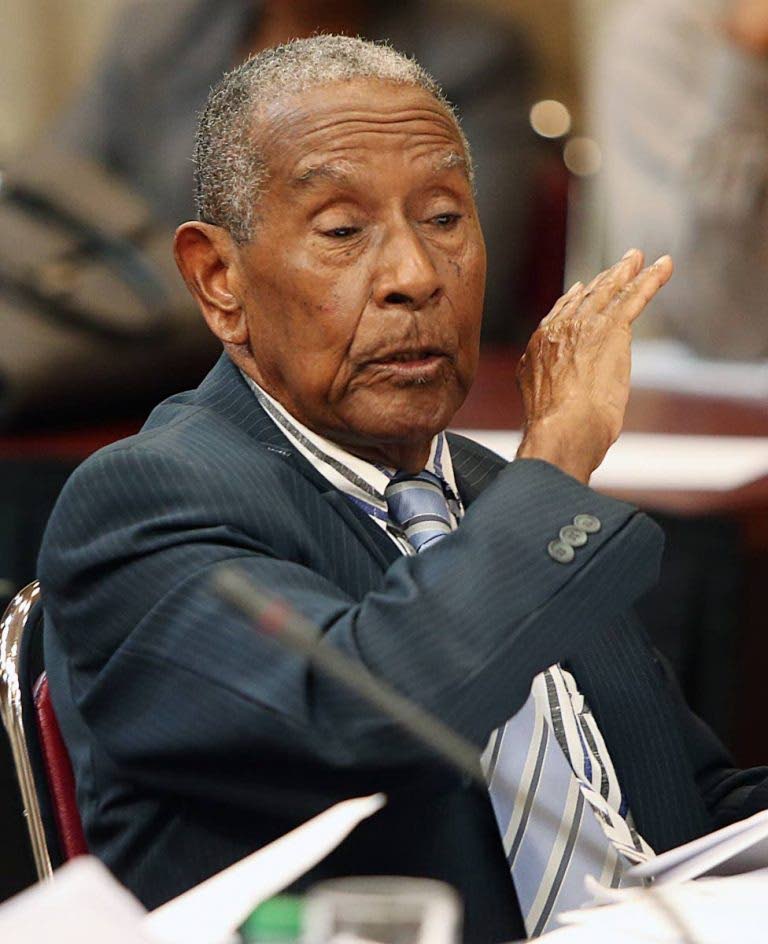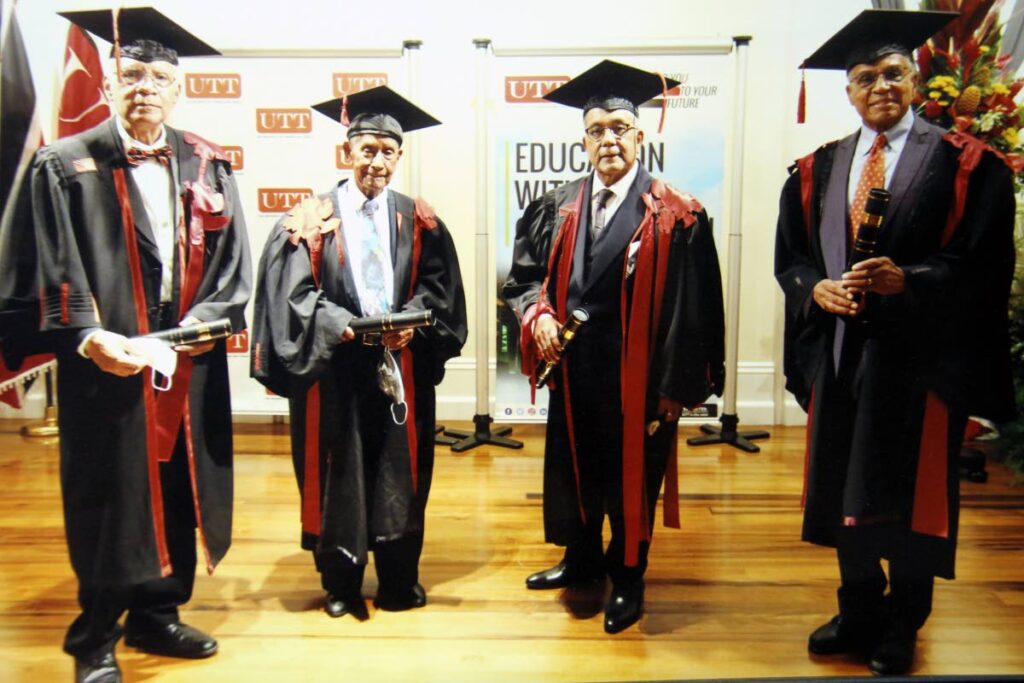Ferdie Ferreira, 90-year-old commentator, set to publish Portraits of a Patriot

FERDINAND Ferreira describes himself as the Dean of Docksford, having received his education at the University of Woodford Square and spending most of his professional life on the Port of Spain dock during his 33 years in public service.
In reality, Ferreira, "Ferdie" as most friends and others know him, boasts an unusual feat of having received an honorary doctorate of Humane Letters from the University of Trinidad and Tobago (UTT) last year; unusual, as he confidently acknowledges, because he never received a formal education, yet became a close friend and adviser to none other than the first prime minister of TT, Dr Eric Williams, and successive leaders of the People’s National Movement.
The former dock worker, a self-taught political commentator, and columnist will release his second major publication Portraits of a Patriot next week.
Ferreira was born of an “Afro-Potogee” father and Barbadian mother, and the great-grandson of an African slave — someone who was poor and considered second class by the white elite. He takes after his father in several ways, not least in his fondness for alcohol.
Even at 90, Ferreira is as much a limer as many half his age.
Having started as a simple port worker, running errands, Ferreira retired after being promoted to deputy manager and former commissioner at the Port Authority, and managing director at the Port & Maritime Services. He was a national officer of the Seamen and Waterfront Workers Trade Union, playing the role of a manager at the dock but also someone invested in the interests of his workers.
Ferreira looks back on his career with gratification, believing he held every one of PNM’s political leaders to account – even as a founding member of the party – whether through direct criticism or by means of his thousands of letters submitted to various national newspapers for over six decades.

Although he shared dinner with Williams on countless occasions and advised him regularly, that didn’t stop him from being barred from the party and Balisier House in 1980. Ferreira readily acknowledges that the party is not without fault, especially today.
A step into Ferreira’s Blue Range, Diego Martin home, which he bought at a bargain price in the 1980s, speaks volumes about his mindset.
One’s eyes are immediately drawn to a contrasting assortment of books on his living room table, including a biography of China Communist Party leader and President Xi Jinping, atop a copy of a Time magazine featuring former US president Barack Obama on the cover and perhaps most surprisingly a book on business magnate Elon Musk; surprising because Musk is famous for his technologically advanced and innovative products, and Ferreira says he’s not exactly computer-literate.
He doesn’t write as much as he used to but when he does, he does so with pen and paper for someone else to type up before sending to a newspaper editor. Ferreira still has laminated clippings of decades-old letters.
In his library, there are biographies and memoirs of many other world leaders. He gives all perspectives at least a thought.
“I’m a big fan of Elon Musk,” said Ferreira, but not because of his projects and particular innovations per se, but the tenacity and charisma that makes him the richest person in the world today.
Ferreira reads a lot. That’s where his informal education actually came from. He said he never stops learning.
So he advocates for the country’s pioneers to immortalise their achievements and contributions by writing their autobiographies or having their biographies written, to keep current and future generations informed.
Last year, he spoke at the launch of former chief justice Michael de la Bastide’s biography Within the Law: Memoirs of a Caribbean Jurist, during which he lamented a lack of documentation of the lives and achievements of people such as the country’s first governor-general Sir Solomon Hochoy, former presidents Sir Ellis Clarke and Noor Hassanali, and former prime ministers George Chambers, Basdeo Panday and Patrick Manning.

He says as most of Trinidad and Tobago’s outstanding citizens, for whatever reasons, have not found the time to document their biographies, they leave generations with missing links, “generously providing our rumour-mongering society with the perfect recipe to engage in the national past time of false propaganda, misinformation, conspiracy theories and sometimes irreparable damage to the legacies of many of our most notable and patriotic citizens.”
Although Eric Williams’ life and career are sufficiently documented, Ferreira says he, too, has fallen victim to misinformation.
Ferreira isn’t critical for the sake of it, but he says one of his particular pet peeves is the expression of an uninformed opinion, like those too often expressed about Williams.
He actually published his autobiography in 2007, titled Political Encounters 1946-2016, in which he documents briefly, his early life, and more extensively his close relationship with Williams and other major influential players in TT politics. His thrilling political experiences relayed in the book are supported by priceless photography, visualising both the charming and unflattering sides of Williams, Manning, and key political figures.
Williams was clearly more of an introvert but less obvious was his humility off-stage. In fact, as he wrote, Williams’s taste in liquor and even food was less sophisticated than Ferreira’s, owing to the duty-free benefits he received working on the docks.
As Ferreira recalls, Williams first invited him for dinner when he became Prime Minister, over a box of Famous Recipe fried chicken, a brand back then that preceded the popular KFC and Royal Castle franchises.
In spite of his helping establish his life-long party, and apart from his former role as the PNM’s labour relations officer and elections officer, Ferreira steered as clear as possible of direct involvement in politics in order to maintain his independence as a commentator.
He did so to his own detriment at times but diplomatically, he says, without disrespecting the relevant party leader.
Yesterday’s local politicians had their faults, but today’s political pool, he describes as a “watering down of the brandy from the “Eric Williams/Capildeo era.”
Williams, for example, knew how to behave and function, he said.
With his patience diminishing, in 2016, after the previous year’s general election, which the PNM won, Ferreira successfully lobbied Republic Bank to buy and donate copies of a book by British politician David Owen, The Hubris Syndrome: Bush, Blair and the Intoxication of Power, to all MPs, hoping those with oversized egos would find the humility to read and understand their duties to the country as opposed to their selfish ambitions.
In spite of his lack of formal education, Ferreira is critical of the role of universities, given what they profess to achieve against what they actually do achieve.
Upon collecting his honorary doctorate at the UTT’s graduation ceremony last year, Ferreira reminded the institution about its role in shaping future leaders.
“Are they (universities) filling the role…of producing and delivering the quality of political and public leadership; the standards of morality, integrity, and productivity required by us, as a small, very resourceful nation to meet the demanding standards of our competitors; to earn the respect and admiration of a ruthless competitive, unforgiving world that does not suffer fools gladly?” he asked.
“Are we satisfied with the standards of behaviour, integrity, and productive capacity of our leaders and our public servants, who comprise (mostly) graduates from our regional and local institutions of higher learning?”
As for politicians and everyone else, he says, “There cannot be and never will be a substitute for the good citizen; patriotism to one’s country is not, and should not be a negotiable item.”

Comments
"Ferdie Ferreira, 90-year-old commentator, set to publish Portraits of a Patriot"